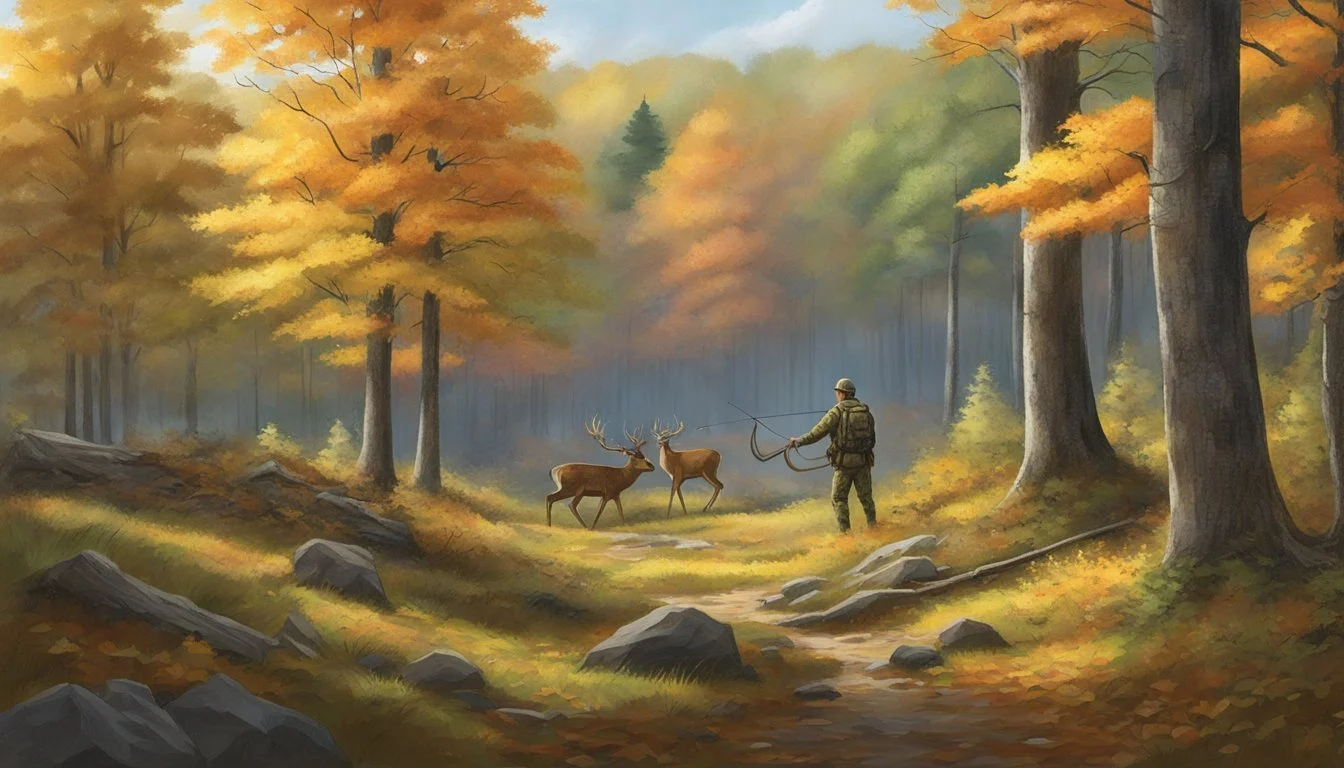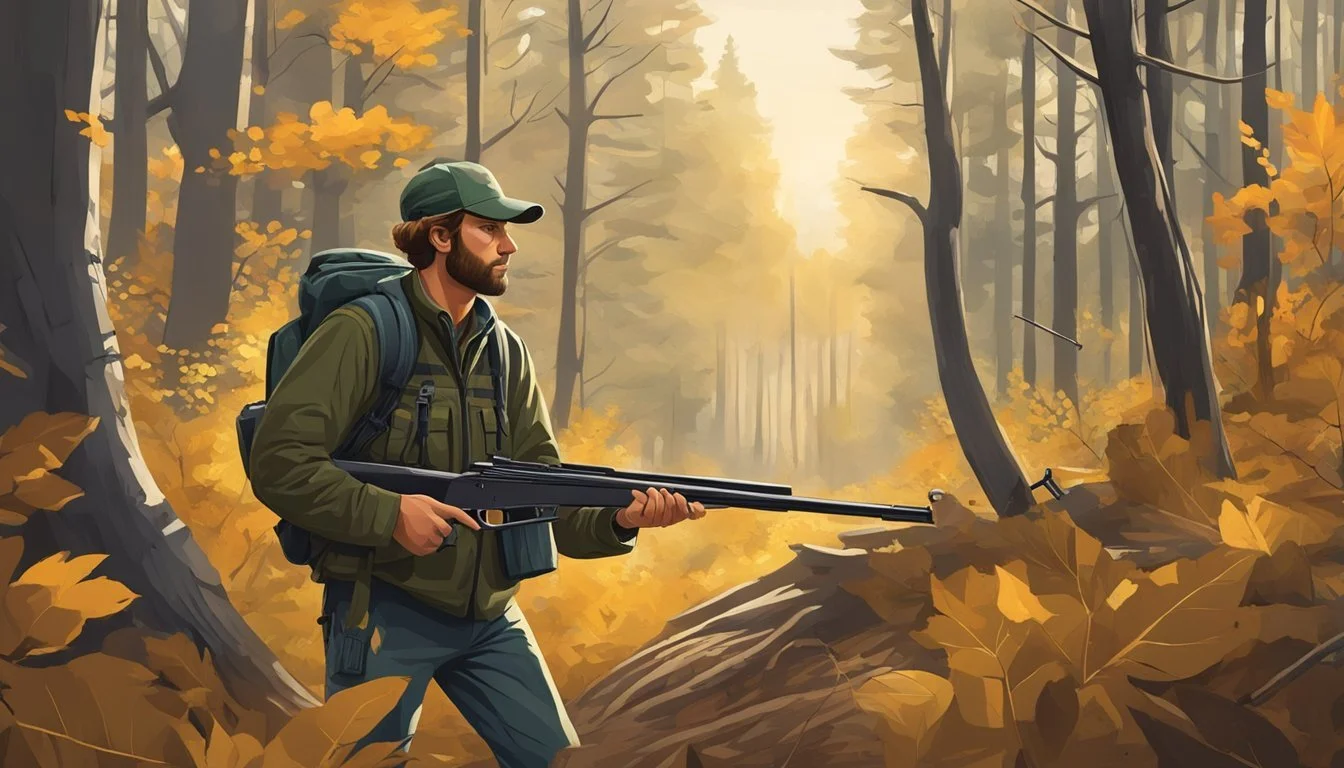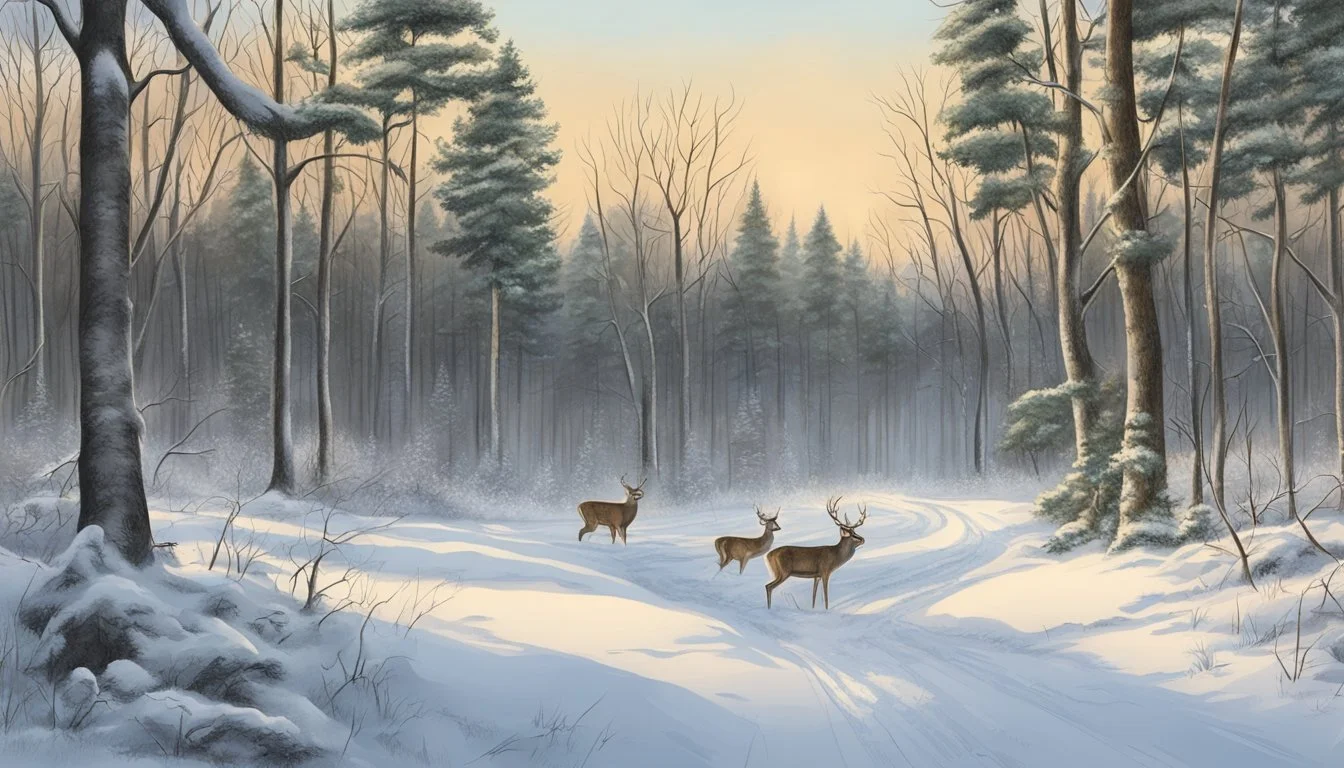Hunting Seasons in Wisconsin
Key Dates and Regulations
This Article is Part of Our Hunting Seasons Guide for All 50 US States
Wisconsin boasts a rich tradition of hunting, recognized nationally for its abundant white-tailed deer population and as a habitat for a diversity of wildlife. The state offers a variety of hunting seasons throughout the year, catering to the pursuits of different game. Each year, specific dates and regulations are set for the hunting of deer, bear, migratory birds, wild turkey (What wine goes well with turkey?), small mammals, and other game birds, ensuring sustainable wildlife management and conservation efforts.
The hunting seasons in Wisconsin typically commence in the fall, which is a prime time for hunters to engage in the sport. With the state's commitment to maintaining a thriving ecosystem, hunters are provided with ample opportunities to pursue game within the guidelines established by the Wisconsin Department of Natural Resources (DNR). These regulations, which include season dates, application deadlines, and hunter safety requirements, are designed to provide a fair and ethical hunting experience while preserving wildlife populations for future generations.
In addition to enjoying the sport, hunters contribute positively to local economies and play a vital role in wildlife management. By adhering to the established hunting seasons and regulations, they contribute to the control of wildlife populations, preventing habitat degradation and ensuring a balance in the ecosystem. Hunting licenses can be purchased, and interested parties are encouraged to sign up for hunter safety programs to ensure compliance with state hunting regulations and safety protocols.
Overview of Wisconsin Hunting Seasons
Wisconsin provides a range of hunting seasons throughout the year, with specific dates and regulations tailored to maintain both wildlife population health and hunter satisfaction. These dates and rules are designed taking into account species-specific considerations and regional management needs.
General Season Dates
The general hunting season dates in Wisconsin are established annually and include various periods for different game species. For instance:
Deer: The nine-day gun deer season is a significant event for Wisconsin hunters, usually running in late November. The 2023 gun deer season spans from November 18 through November 26.
Wild Turkey: Offers spring and fall seasons, with various periods based on zone.
Regulatory Zones
Wisconsin's hunting landscape is divided into specific zones that dictate the season dates and regulations.
Deer: Hunting zones for deer are delineated to manage the population effectively, each with its own set of hunting dates.
Migratory Birds: Regulations for hunting these species also vary by zone and often align with migratory patterns to ensure sustainability.
Species and Seasons Overview
Wisconsin's diverse array of hunting seasons includes:
Deer Hunting Season: The state is renowned for its white-tailed deer hunting, providing ample opportunity during the designated seasons.
Wild Turkey Season: Both spring and fall seasons are available for turkey hunting, with each offering a distinct hunting experience.
Migratory Birds: Seasons for migratory bird species are set within the framework of federal guidelines to ensure proper conservation and management.
Other Game Species: Wisconsin also regulates seasons for small mammals, other game birds, furbearers, and more.
The 2023 season dates incorporate these and other species-specific regulations to ensure a structured and responsible hunting experience across the state.
Licenses and Regulations
In Wisconsin, hunters are required to adhere to both licensing procedures and hunting regulations to ensure legal and responsible practices during hunting seasons.
Hunting Licenses
Hunters must obtain the appropriate licenses before engaging in any hunting activities. In Wisconsin, hunting licenses are mandatory and vary depending on the game species, hunter's age, and residency status. Licenses can typically be purchased through the Wisconsin Department of Natural Resources (DNR) website, at DNR service centers, or authorized license agents.
Resident Annual Hunting License: For Wisconsin residents
Non-resident Hunting License: For out-of-state hunters
Youth Hunting License: For hunters under a certain age
Senior License: For hunters who are seniors
Application Deadlines: Certain hunts may have specific application deadlines and limited quotas. Hunters are advised to check the DNR website for the most current information.
Regulation Compliance
Compliance with state laws and regulations ensures sustainable wildlife populations and fair chase principles. Wisconsin hunting regulations are comprehensive and cover aspects ranging from shooting hours to bag limits and special county rules.
Shooting Hours: Defined for various game species
Bag Limits: Specify the maximum number of animals that may be harvested
Baiting and Feeding: Rules that vary by county and game species
Hunters must also follow laws concerning the use of specific hunting equipment, methods, and the requirement to wear blaze orange clothing during certain seasons for safety.
Online Resources and Updates
Staying informed about current regulations is essential, as they can change based on wildlife management needs and legislative updates.
DNR Website: The primary resource for the latest information on hunting seasons, regulations, and license purchasing.
E-Regulations: Offers digital copies of the official hunting regulation documents.
Email Updates: Hunters can sign up for regular updates from the DNR website.
By using these resources, hunters can remain compliant with up-to-date regulations, ensuring a lawful and ethical hunting experience.
Deer Hunting Seasons
Wisconsin offers a myriad of regulated deer hunting seasons to accommodate various hunting methods, including archery, crossbow, and firearms. Each type of hunt has its specific dates and regulations ensuring a responsible and sustainable approach to wildlife management.
Archery and Crossbow
The archery and crossbow seasons cater to hunters preferring a stealthier approach using bows or crossbows. The season typically spans several months, giving archers ample opportunity to harvest deer.
Gun Deer Hunt
The gun deer hunt is a highly anticipated season which traditionally transpires over nine days in November. During this period, hunters are allowed to use high-powered firearms, and the state witnesses an influx of hunters eager to take part in this tradition.
Muzzleloader
Following the gun deer hunt, a muzzleloader-only season is held, offering an exclusive period for hunters who enjoy this historical and challenging method of hunting.
Youth Deer Hunt
The youth deer hunt aims to foster hunting skills in younger enthusiasts. This special season provides an opportunity for youth hunters to participate before the regular seasons.
Antlerless Hunts
To effectively manage the deer population, antlerless hunts are designated in specific areas. Such hunts include December 4-day antlerless-only hunts and are crucial for maintaining a healthy deer herd across the state.
Metro Sub-Unit Hunts
In certain metro sub-units, tailored hunting regulations allow for the management of deer populations in more urban settings. Maps outlining these regions are available to guide hunters.
Careful adherence to rules regarding baiting, shooting hours, as well as the purchase of bonus antlerless deer harvest authorizations are vital for all participants. Regulations can vary across farmland (zone 2) counties, and hunters are advised to consult local guidelines. These seasons reflect a balance of sport, tradition, and conservation, ensuring the deer populations are managed sustainably for generations to come.
Waterfowl and Migratory Game Birds
Wisconsin’s rich tradition of waterfowl hunting is supported by dedicated conservation efforts, ensuring the state remains a prime destination for hunting migratory game birds. The state's migratory bird hunting seasons are carefully structured to provide hunting opportunities while maintaining healthy bird populations.
Early Teal and Early Goose
Early Teal season allows hunters a unique opportunity to harvest these fast-flying birds. The season typically begins in September; however, specific dates may vary annually and by zones. Early Goose season targets resident Canada geese before the arrival of migrants and also generally opens in September.
Duck and Goose Seasons
Wisconsin is divided into the Northern Duck (What wine goes well with duck?) Zone, Southern Duck Zone, and the Open Water Duck Zone, each with its own specific season dates to maximize hunting opportunities and manage local populations. For goose hunting, the state is segmented into the Northern Goose Zone, Southern Goose Zone, and the Mississippi River Goose Zone.
Duck Seasons:
Northern Zone: Early-mid October to late November
Southern Zone: Early October to early December with a split season
Open Water Zone: Same as the Southern Zone, with special regulations
Goose Seasons:
Northern Zone: Early September to mid-December
Southern Zone: Early September with a split season extending into late December
Mississippi River Zone: Concurrent with the Northern and Southern zones but with specific dates for the Mississippi River area
Other Migratory Game
Additional game birds on the migratory list include rail (Virginia and sora), snipe, common gallinule, mourning dove, and woodcock. Coots can also be harvested during the duck seasons. Each species has specific season dates and regulations. For enthusiasts of falconry, there are also special seasons for hunting migratory game birds using trained raptors, offering an ancient tradition a place in modern conservation and sport.
Notable Season Dates:
Mourning Dove: Early September to late November
Woodcock: Typically mid-September to early November
Sora and Virginia Rail, Snipe, and Common Gallinule: Early September to late November
Youth Waterfowl weekend is designed to introduce young hunters to waterfowl hunting and typically takes place in late September. During this weekend, only youth hunters are allowed to hunt and bag migratory waterfowl.
Other Game Seasons
In addition to deer and waterfowl, Wisconsin offers diverse hunting opportunities for turkey, bear, and a variety of small game during specific seasons. Trapping seasons also provide regulated periods for capturing furbearing animals.
Turkey
Spring Turkey Season: The spring turkey hunt is divided into six time periods, typically spanning April and May. A special Spring Turkey Youth Hunt takes place prior to the regular season, offering young hunters a dedicated weekend.
Fall Turkey Season: Fall turkey hunting extends through the autumn months, with specific dates varying by zone. Hunters can pursue both male and female turkeys during this time.
Bear
Bear Season: Wisconsin’s bear hunting season typically begins in early September and can last until mid-October. Zones are clearly defined, and baiting and dog use regulations vary by region.
Small Game
Small Mammals:
Cottontail rabbit and squirrels (gray and fox): The hunting seasons often start in mid-September and continue through February of the following year.
Snowshoe hare, jackrabbits, and flying squirrels have specific dates and may differ by zone.
Game Birds:
Pheasant: The season generally opens in mid-October and closes at the end of December.
Hungarian partridge and ruffed grouse: Typically follow similar dates as pheasant.
Sharp-tailed grouse and crow: These species have special season dates and may require permits or be restricted to specific zones.
Trapping
Furbearers:
Species such as badger, skunk, opossum, weasels, woodchucks, and porcupine can be trapped during open seasons that usually begin in early October.
Beaver and otter seasons vary by region with specific start and end dates generally falling in the fall and winter.
It is imperative for hunters to check the latest regulations and obtain appropriate licenses for the season and game they are pursuing.
Hunting in Wisconsin: Special Considerations
In Wisconsin, hunters must navigate a variety of special regulations and considerations, such as accommodating hunters with disabilities, adhering to guidelines for hunting with dogs, and understanding the intricacies of seasonal and zone-specific regulations.
Hunters with Disabilities
Wisconsin offers accommodations to ensure that hunters with disabilities can participate in hunting seasons. These may include special hunting blinds and permits that allow for hunting from a stationary vehicle. Disabled hunter deer seasons are offered on private property and are facilitated by landowners volunteering their land for these hunts. Deer permits are required for all hunters, and there are antlerless-only hunts designed to manage the deer population.
Hunting with Dogs
The use of dogs for hunting in Wisconsin is subject to strict regulations to protect both the wildlife and the dogs. When hunting with dogs, it is imperative to follow statewide bag limits and ensure the dogs are trained and under control to prevent conflicts with wildlife, particularly in the open water zone, where retrievers are commonly used for waterfowl hunting.
Seasonal and Zone-Specific Regulations
Wisconsin's hunting regulations are divided into distinct zones, each with specific dates and rules:
Northern Zone: Comprises the upper part of the state with specific hunting hours relating to longitude and latitude.
Southern Zone: Has different season dates and may have extended opportunities, such as extended archery seasons.
A map of hunting regulations is available to delineate these zones. Close attention to zone-specific regulations is crucial, especially for hunters looking to participate in multiple regions or trying to maximize their hunting season.
By being aware of these considerations, hunters can ensure they are following the law and maximizing their Wisconsin hunting experience.
Conservation and Ethics
In Wisconsin, hunting seasons are carefully regulated to balance wildlife populations and ecosystem health. Conservation initiatives by the Wisconsin Department of Natural Resources (DNR) and adherence to ethical hunting practices are crucial for sustaining this tradition.
Wildlife Management
The Wisconsin Department of Natural Resources plays a pivotal role in shaping the state's wildlife conservation policies. Its objectives include:
Population Control: Limiting or encouraging the growth of animal populations to prevent overpopulation or extinction.
Habitat Protection: Ensuring that the natural habitats of wildlife are preserved and maintained for future generations.
Through scientifically informed regulations, such as setting specific hunting seasons and bag limits, they aim to maintain balance within ecosystems and ensure species longevity.
Ethical Hunting Practices
Ethical hunting practices are emphasized by the Wisconsin DNR to promote respect for nature and fair chase principles. Key aspects include:
Respect for Wildlife: Hunters are expected to value the life of prey and to hunt only within seasons and limits established by law.
Fair Chase: Pursuing game in a way that does not give the hunter an improper advantage over the animal.
Safety and Skill: Using hunting methods that ensure a quick and humane kill to minimize animal suffering.
Ethical hunters also engage in practices that contribute to the local ecosystem and community, such as participating in disease management initiatives and educating others about conservation.
Resources and Additional Information
The Wisconsin Department of Natural Resources (DNR) provides ample resources and tools to assist hunters in planning their activities. The DNR's official website serves as a comprehensive hub for up-to-date maps, regulations, and contact information.
Maps and Apps
The DNR website offers a variety of interactive maps and mobile applications designed to help hunters navigate hunting grounds, understand topography, and identify public lands open to hunting. These resources include:
Public Access Lands (PAL) Atlas: A detailed map showing all public lands available for hunting.
DNR Go Wild: An app that allows hunters to manage their licenses, tags, and bonus harvest authorizations.
Contact Information for DNR Support
For direct support, the Wisconsin DNR provides several contact options to cater to hunters' inquiries and needs:
Method Details Phone Toll Free: 1-888-WDNRINFO (1-888-936-7463) Online Questions can be submitted through the DNR website's help center. Social Media The DNR's social platforms can also provide news and updates.
Hunters are encouraged to reach out for assistance regarding season dates, regulations, or any other hunting-related inquiries.






